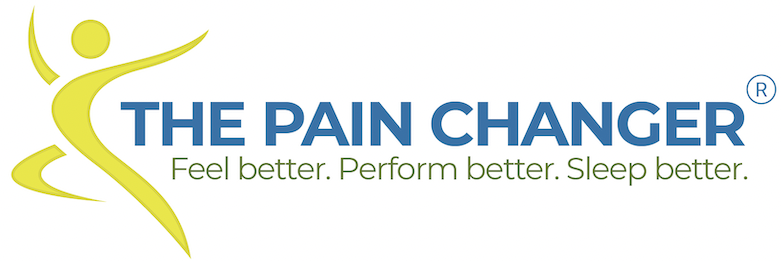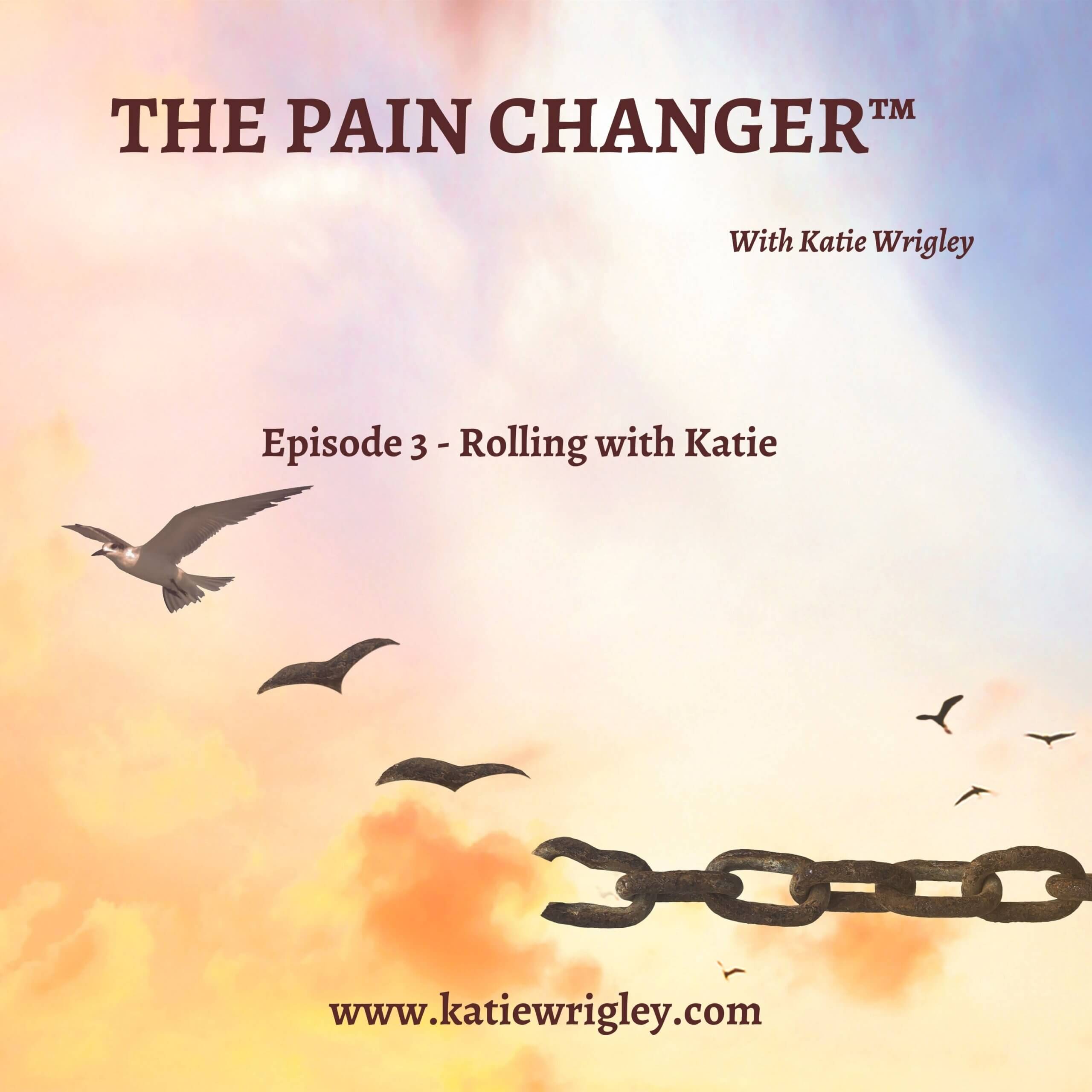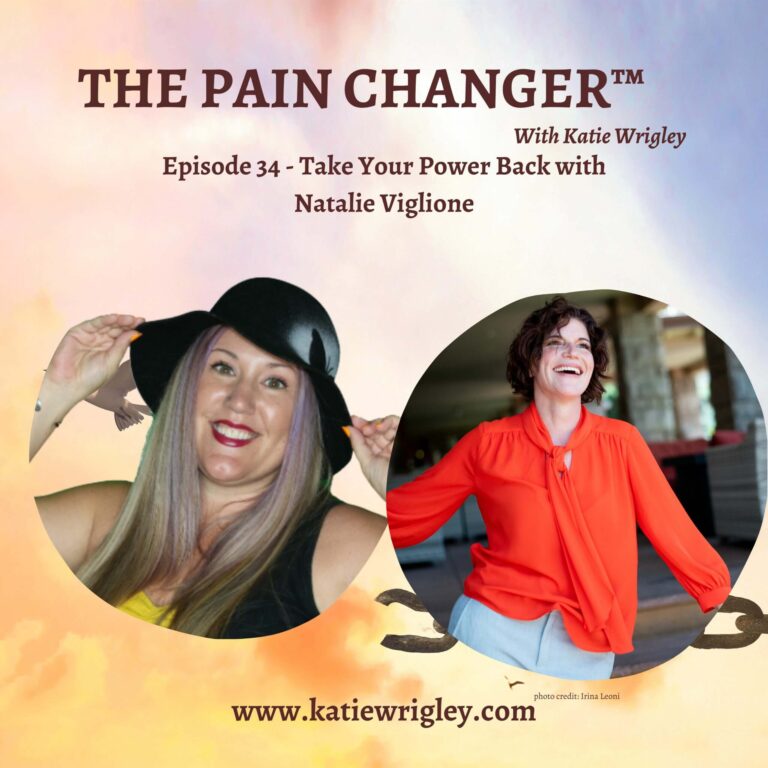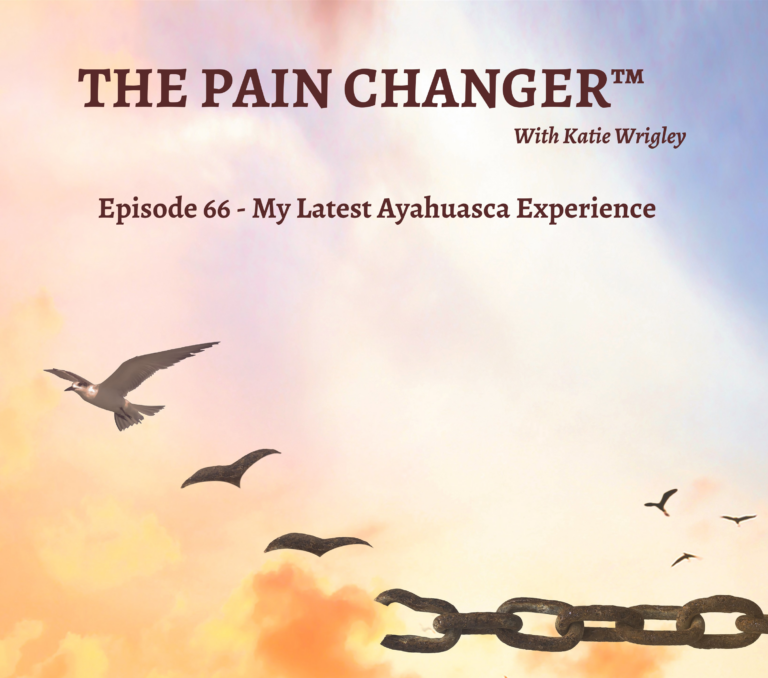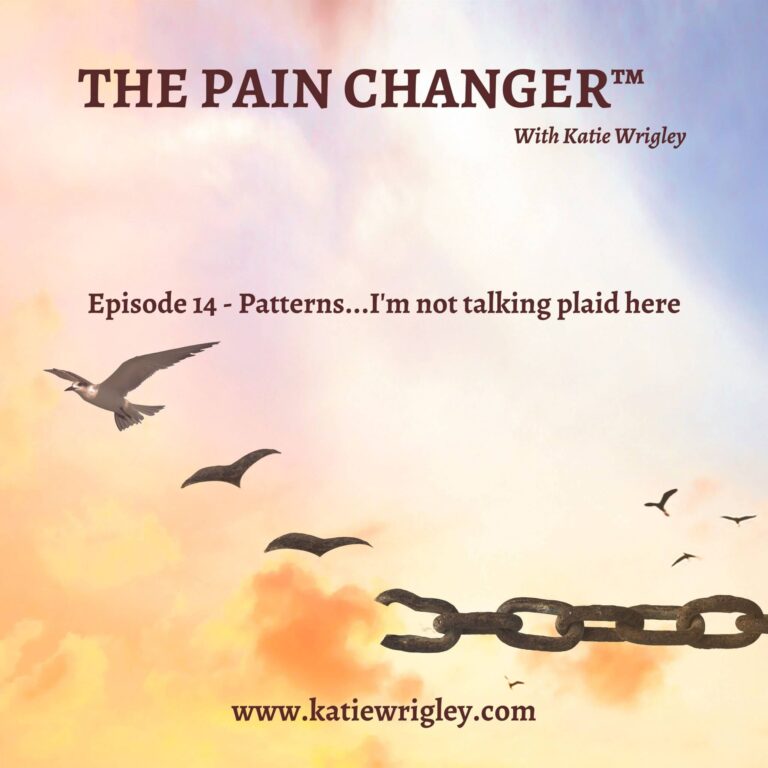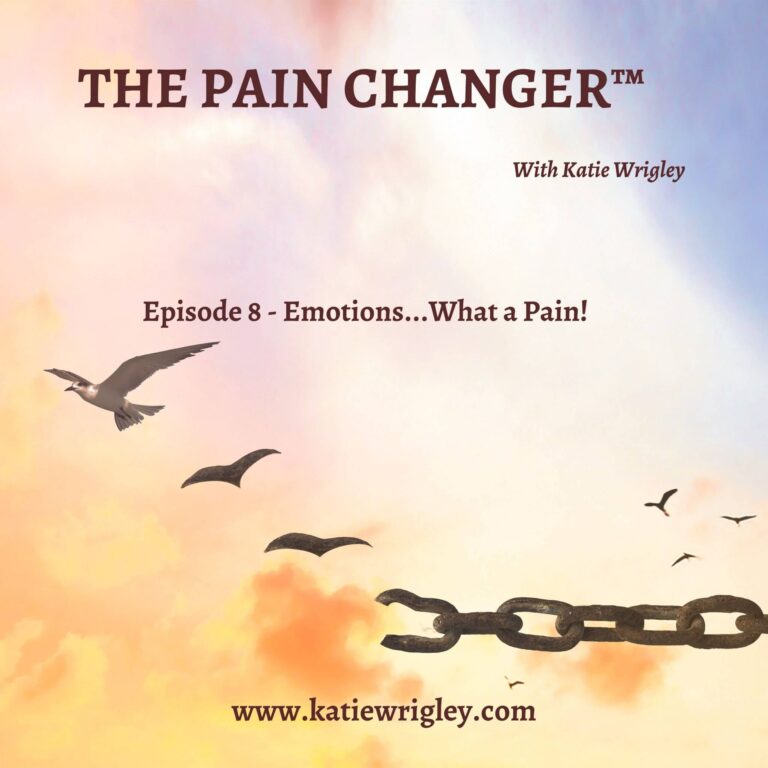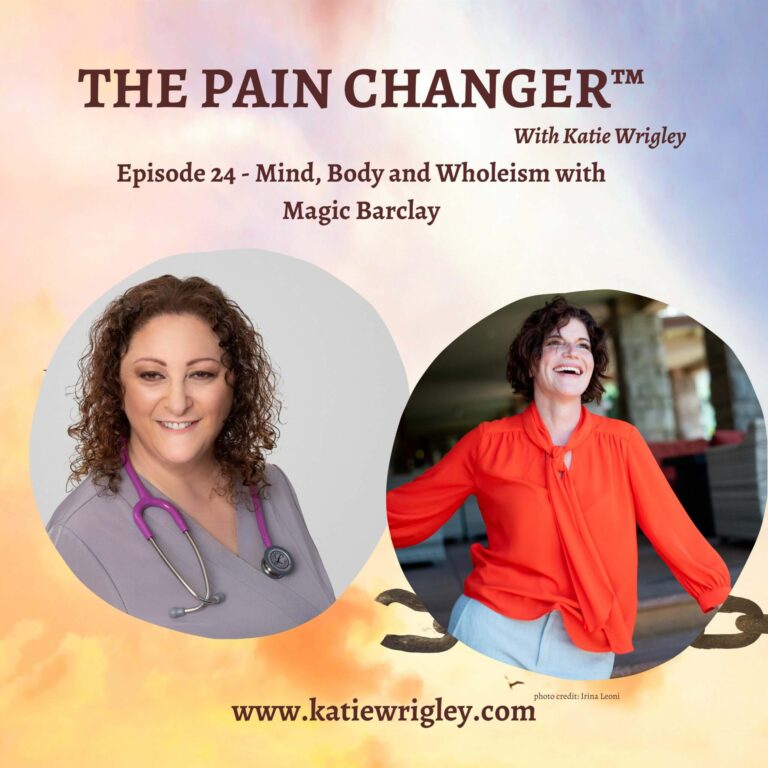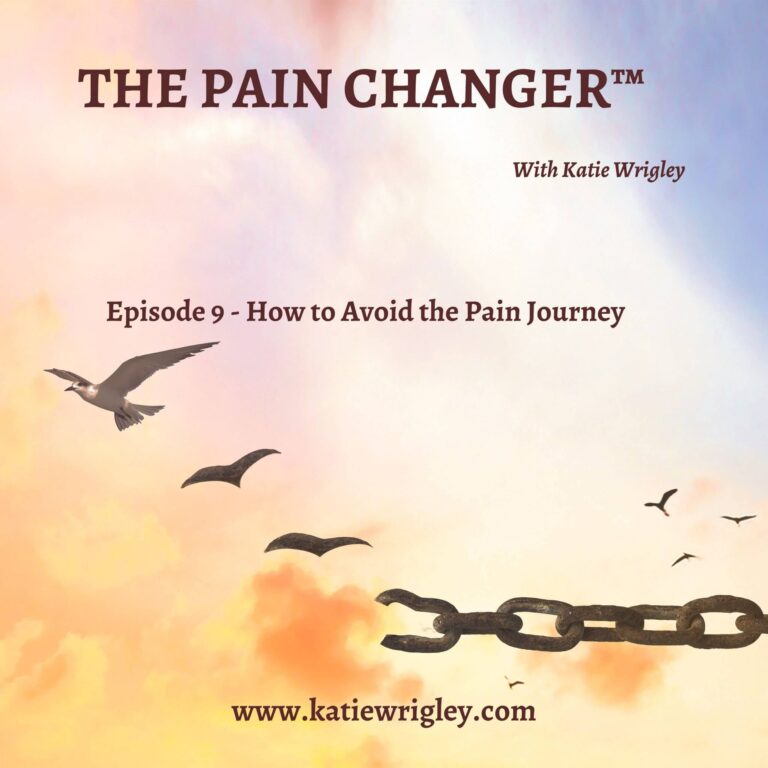Episode 3: Rolling with Katie
Transcript…
Learn what its like to learn how to manage your pain. Start to bring awareness to 4 areas where you can directly impact your pain.
Last week on The pain change podcast you learned what cognomovement is and how it works. For the past several years, Katie has been following what she discusses in today’s episode. This methodology is brought Katie from disability to thriving and she continues to gain strength and feel better. These methods have helped not only Katie but her clients as well. Grab a notebook. It’s coming up next.Welcome to the pain change a podcast where you learn insider tips and tricks to help you improve your pain levels without the nearly daily trips to the doctor, or heavy pain meds. When you change your mind you will change your experience with pain. Every week, the pain change your podcast will teach you new ways to tune into your body in order to change your mind. If you had to scrape yourself off the bed like you’re an undercooked pancake on an ungreased pan this morning. You’re in the right place. Here’s your host Katie Wrigley.This is the Pain Changer Podcast Episode Three – how I roll. Since my mom told me one time that life is 80% uneventful, 10% tragic and 10% pure joy. My mom told me one time that life is 80%, uneventful, 10% tragic and 10% pure joy. She was trying to comfort me but the idea that I wouldn’t know 80% of my life, and I would only experience joy for 10% wound up making me feel really depressed. I decided in that moment that I was going to bring the fun to everything I do whenever possible. So yep, I brought it to pain management too. If you think pain management is boring, Today’s episode will hopefully change your mind. Comedy is one of the ways that I’m different as pain management coach. Being in pain is not funny, and I know you know this already. Hanging pain sucks. However, the benefits of laughter are too important to skip over weekly doses of laughter lower pain levels, decrease inflammation and raise quality of life. But how do you find laughter when you hurt so much? A big part of the pain change your methodology. A big part of the pain change your methodology I use with clients came from my own experience when I was disabled. I realized quickly that my body literally couldn’t tolerate drama or suspense. Watching the news culminated in a tension headache and a drop in mood. Suspenseful shows made my head hurt worse, no. Suspenseful shows made me hurt worse, as every muscle was clenched in anticipation as I got into the show, I started watching only comedies to a point that I thought a few times that I had actually found the end of Netflix. That’s an anxiety-inducing thought for me. What about you? What happened when I watched comedies, I didn’t think about my pain. And if I did think about it, I noticed that it didn’t feel as bad when I was laughing. This was interesting. There wasn’t much that was invoking laughter in my life. At that point. Part of my pain was in my neck, which didn’t make reading an option. So I got absorbed into my TV to help me navigate my disability. It also helped me forget about everything that was weighing on me at the time, medical bills, pending surgeries, getting a ride to doctor’s appointments when I couldn’t yet drive myself.Then I realized it went a lot deeper than just comedy. When you get into a state of high pain, everything matters. The words you use to speak to yourself as well. The words you use to speak to yourself as well as the words you speak to others. The tone matters to you can’t say in an angry tone to a body part that you’re trying to cope spec to help of you. Your party won’t pay that shit. repetition of words becomes pretty important too. Such as, how often are you telling yourself you’re in pain? How often is that by the way? Every hour, every minute, 10 times a day. It’s so understandable that you are reminding yourself you’re in pain. And every time you tell yourself that you hurt, your body will immediately validate that for you and confirm that yes, indeed. You still hurt. a lot. Now, what about the word should? How often do you say that? Is it a rare word? Are you shitting all over yourself? The word should implies that you’re doing something wrong now. And the other thing that you air quote should do is what is right. That led me other areas that needed focus initially was Shannon’s guidance and suggestions but didn’t grow into my own thing. This became the premise of the pain change your methodology.This became the premise of the pain change your methodology I use, I divide life into three. Good God. I divide life into four areas where I have seen Jesus Christ. I divided life into four areas where I have seen we can have direct impact, verbal, emotional, mental and physical. I started looking at my physical environment as well as what I was doing with my body on a daily basis. Now I asked you, are you moving each day? If so, how much? What are you doing to move? Can you even move? What are you eating? And how does it impact your body. For instance, canola oil is inflammatory, almost every salad about for instance, canola oil is inflammatory. Almost every salad dressing bottle I’ve looked at contains canola oil. So there you are trying to nourish your body with a healthy salad. And the dressing you chose maybe increasing your inflammation. Diet matters. In January of this year, I did a 30 day juice fast boy, was it challenging, and I am so glad I did it. Nothing but freshly made juice and homey nut milk and tea for 30 days. The result was that my body felt better, and it completely reset my tastes. Since ending the fast almost 60 days ago now, I’ve only gained back two pounds of the 12 I lost, my body still feels great. pain levels continue to diminish, and my energy is really high. I’m also consuming probably 75% fruits, veggies and nuts. Now, despite knowing the impact of diet, I am still blown away by how much better I feel, and also by how easy it is to continue to eat this way.This is the way my body wants me to eat. Do you have another condition where you need to be extra careful with diet, such as diabetes or celiacs disease. Note what happens to your body when you eat food your body doesn’t want. For instance, I love eggs. I love them. I can eat them every day. But if I do, I get a massive tension headache for the remainder of the day. However, if I eat them just one or two times a week, my body loves them. And they feel me. I’m almost embarrassed to share. It took me years to figure out how often I can enjoy eggs without a headache. It took me years because I wasn’t aware enough to figure out the pattern. Your environment, exercise diet, and the words you use are not the only places that impact pain. There’s also your mental and emotional state. There is an emotion behind every experience of pain. Now, if you’re anything like me, you’re calling bullshit right now. That’s totally fine too. Trust me on this. I was in such denial about any link between my pain and emotions that I rendered myself disabled before I faced my shit. Subsequently dealing with my shit, aka my emotions, that allowed me the freedom to live again. Go figure. Keep with me, keep with me. Keep with me on this for a minute. If you’re still doubting me, let’s look at Back Pain. Lower Back Pain is often tied to fear of financial scarcity. That was a huge factor of my own back pain.What about you? If your back hurts? Do you have any fear around financial scarcity? With inflation going out of control right now along with gas prices? What’s happening in your body? Plus, you probably have some feelings about the pain you experience already. How do you feel about your physical pain? Do you see what I mean? Now what about the people in your life? Are the people closest to you loving and supportive? Do they enable you and give you? Do they enable you? Or do they empower you and give you true support? Are they positive or negative as a general role? Can you be vulnerable with them? Part of why I became disabled was because my house was full of people who didn’t care about me. I could feel that on a deep level and it greatly impacted my healing. Alternatively, when I was back in my own space after I moved to Maine, and I wasn’t around anyone else’s negative energy anymore, and I only hung out with my mom, my dad and my dog at the time, I started to really flourish. I was around the people I love most and The world and my body was benefiting from being around loving energy. Yes, my dog is a person isn’t yours. There’s so much more to each area than I just outlined to. When you work with me as a coach, this is part of what we go over together those areas of life.Each week within a cognate movement session, we will focus on a physical sensation, or an emotion that’s linked to these. Each week within a cognate movement session, we will focus on a physical sensation, or an emotion that’s linked to these sensations. For instance, I recently did a session around fear with someone who has fibromyalgia. She’s reported that the achy Fibro feeling is now gone. Pretty cool, huh? Yeah, I think so too. In between sessions, I recommended journaling. In between cognitive movement sessions. I recommend journaling and other activities outside of sessions to help drive more awareness into each of these areas in correlate them with your pain levels. There’s even a free ebook on my website that you can download for guidance. Just go to Katie Wrigley calm, enter your email address and receive your free copy. Awareness is key. And this is a big reason I offer coaching for those who purchase a bundle with me. Unless you’re aware, you can’t change it. Why does awareness matter? Let’s go back to my client I mentioned in the last episode, who had the pattern of anger equalled love running in her body. And let’s use this as another example of why awareness matters. Until she was aware, she would count and until she was aware, she would unconsciously do things to anger her partner in order to feel loved. She didn’t know what was happening, and she would also respond in anger. Until she was aware, she didn’t have access to the option to continue to choose that pattern, or to choose something entirely different. Now she’s aware, she deleted that pattern and her love relationship looks much healthier now. Instead of antagonizing her partner, now she communicates and expresses how she feels. Why else does awareness matter? Your mind likes to play tricks on you, especially when you have chronic pain. This means it can give you a false sense of how things are another client I work with who has severe pain. Notice this on a grant scale. He and his partner started an accountability calendar to help track chores as well as the state of their relationship. He thought they were fighting constantly and things felt like a constant battle. But when they started to note it on the calendar, he realized he felt that way because the fights were heavier, so they cast a bigger shadow. Once they started tracking the health of their relationship on that calendar, two things happen. One, they really gave it extra thought before starting to argue with one another to be both realized they didn’t fight as much as they thought. After a few tweaks with wording such as shifting, the hell is wrong with you, too. Is everything okay? You look upset right now. And continuing to bring awareness to their relationship and balancing it all. They now feel they’re in the best place they’ve ever been. Another way I differ as a pain management coach is what I consider pain, as well as what I see as phases of pain. Most people in pain management are focused on physical pain. In my experience, emotional pain can hurt just as much if not more than physical pain. So I consider all Pain is pain we can work on together to help improve your quality of life. Have you ever had your heart broken? hurts like hell doesn’t it? It physically hurts, but it’s emotional pain. People have actually died over broken hearts. If you have chronic depression or anxiety, you’re living in a state of chronic pain, even if it hasn’t manifested into something more physical yet. If you do not acknowledge and clear your emotions, they will manifest into pain, period. The emotional side is just as important as the physical side. And honestly the two are totally linked. You cannot ignore one and deal with the other one. Trust me. I tried. Emotions and pain go hand in hand. Especially when we add fear, fear and pain like to play like the quintessential Mean Girls stabbing you in the back or tripping you up at every chance. Being able to get a handle on your emotions gives you a lot more control around your physical pain to pain spikes. They can look something like oh my god The pain is never going to go away. This is the worst it’s ever been, I can’t bear it. And in those moments, that’s how it feels for real. And it’s hard to remember. That’s not your normal pain level. The longer we stay on that thought track, the worst we feel on the flip side, and also going back to why lace comedy into my work. Emotions can also lower your pain. When was the last time you laughed? And I mean, really cracked up with tears starting to form and slow down your face and your stomach starting to hurt from laughing so hard. That’s my favorite thing ever, by the way. Well, what happened to your pain when you were cracking up? Did you notice? It probably felt lighter if you were aware. If not, then check in with your body the next time you laugh, what happened? Joy is something else that tends to lower your pain. When you are experiencing bliss or happiness at a high level, Your pain will lower. Same with an elevated mood. When your energy goes up, your pain goes down. Being able to use techniques to shift away from a pain spike is key to lowering back to your baseline. Balancing activities that lower pain and increase your energy can help you build stamina and also allow you to rebound faster during times you can’t avoid a pain spike. The last way i different pain management other than lacing it with comedy versus boring you to death and including emotional pain. Now, the last way are different pain management, other than lacing it with comedy versus boring you to death and including emotional pain, as well as physical pain, is how I view the pain journey. There are three stages. The first stage is preventative, which is before you start to hurt, and or before you’ve been given a diagnosis that contains the word chronic, or you’re told there is no cure. Addiction is born here in this stage. And is also where you may see eating disorders or excessive emotional eating, overworking or other numbing behaviors to help you cope. Anxiety and depression are incredibly common here. Before we go to the next stage, I do know that you may have had a severe accident, despite really awesome self care habits and you found yourself plunged into high levels of pain and all at once to. So you may not have been able to do much to prevent what happened to you. And I get that. I’m so sorry if that was your experience. For me, though, I had a chance after chance to change what I was doing. And I opted not to change anything until I was disabled. I kept telling myself I had plenty of time to change my habits. Sound familiar? Anyway, moving along in the pain journey. The next stage is the corrective stage, which is when you’ve been hurting daily for at least three to six months, you’ve probably been given one or more diagnoses that don’t leave you feeling much hope. And the prognosis probably sucks too. This is where you find the limits of traditional medicine. Usually. This is where you tend to find the limits of traditional medicine. But it’s also where we find the mix that works for us. This stage has a lot of ups and downs. And anxiety and depression have a tendency to get a lot worse here, especially when you hear the doctors say there isn’t much they can do. And you probably spent months or years convincing them something was wrong in the first place before they even heard you. And now they say they can’t do much.But this stage is also where the goodness can happen. This stage is where you find out what works for you. This allows you to move to the next and last stage, which is the maintenance stage. Use the tools and skills you learned in the corrective stage to help continue to allow you to heal and strengthen your body. You work with your doctors to wean off your medications. And you get back to the business of living, loving and laughing again. My mission as a coach is to get you to the maintenance stage. Like I said at the start of the episode, I follow my own methodology. I’m not 100% in those four areas verbal, emotional, mental and physical all the time. Some became automatic, and some required extra attention for a little while. Right now diets automatic as his movement. Stress is higher right now though. And so I’m carefully watching my words. And either someone in my trusted group of people or myself has taught me something. Oh, whoops right mess that up. Stress is higher. For me right now though. I’m carefully watching my words. And either someone in my trusted group of people or myself has caught me with some heavy negativity from time to time. It’s not about being perfect at this. And it takes time to build into a good balance and figure out which balance works best for you. As your body continues to improve, that balance may change to all of that is okay. You will learn as you go, what works best for you, the pain spikes will be fewer, and you will get more time between them. I’ve only had to in the last 18 months. I don’t recall what triggered the first, but I do recall that it resolved within days. The second was due to me not realizing my back’s signals had changed. I was taking on 40-pound kettlebell deadlift one day, followed by a bar class again, within 48 hours, I was back to baseline, the amount it takes to throw me off, that much gets bigger and bigger, which is pretty awesome to see. It wasn’t that long ago that vacuuming my house would flare my pain for a week. That’s me in a nutshell. To me, pain is both physical and emotional.There are a lot of places earlier in the journey where we can take corrective action to avoid a chronic condition. I do know that sometimes the pain journey is sudden like with a bad accident. And it’s not from a long history of avoidance like mine. In that case, you may not have been able to prevent it, but you can still help. But you can still get help to correct it and learn how to lower but you can still get help to correct it and learn how to maintain lower pain levels. That’s where I come in. If you’re curious about working with me, and you want to have a chat, I invite you to schedule a complimentary discovery call with me. Just go to Katie Wrigley comm slash about Dash me and click on virtual chat. Thank you, as always for joining me today. And until next week, never forget that chronic doesn’t have to mean permanent. If you want more of my tips and tricks flowing into your life, then I invite you to connect with me and follow me on social media. Just go to Katie Wrigley comm slash connect and follow the links to whatever your favorite social platform is to follow me. Have you ever found yourself shocked or appalled or maybe both at the cost of medical care? It can seem never-ending at times. Tune in next week when we’re going to discuss what it means to live in a country where disease is for profit. If you’re in the US and listening to this, this means you.
